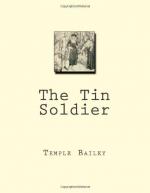“I shan’t tell you. But it was about the war, and your not fighting. As if it made any difference. You are as brave as any of them.”
He glanced down at her with somber eyes. Quite unreasonably he hated her for her defense of him. If all women defended men who wouldn’t fight, what kind of a world would it be? Women who were worth anything girded their men for battle.
He knew now the reason for Jean’s high head and burning cheeks, and in spite of his sense of agonizing humiliation, he was glad to think of that high-held head.
For such women, for such women men died!
But not for women like Alma Drew!
He got away from her as soon as possible. He got away from them all. He had a morbid sense of whispering voices and of averted glances. He fancied that Mrs. Witherspoon touched his hand coldly as he bade her “good-night.”
Well, he would not come again until he could meet their eyes.
It was a perfectly clear night, and he walked home. With his face turned up to the stars, he told himself that the situation was intolerable—tomorrow morning, he would go to his father.
When he reached home, his father was asleep. Derry looked in on him and found Bronson sitting erect and wide-eyed beside a night lamp which threw the rest of the room into a sort of golden darkness. The General was in a great lacquered bed which he had brought with him years ago from China. Gilded dragons guarded it and princes had slept in it. Heavy breathing came from the bed.
“I think he has caught cold, sir,” Bronson whispered. “I’m a bit afraid of bronchitis.”
Derry’s voice lacked sympathy. “I shouldn’t worry, Bronson. He usually comes around all right.”
“Yes, sir. I hope so, sir,” and Bronson’s spare figure rose to a portentous shadow, as he preceded Derry to the door.
On the threshold he said, “Dr. Richards has gone to the front. Shall I call Dr. McKenzie if we need someone—?”
“Has he been left in charge?”
“Yes, sir.”
Derry stood for a moment undecided. “I suppose there’s no reason why you shouldn’t call McKenzie. Do as you think best, Bronson.”
On his way to his own room, Derry paused for a moment at the head of the great stairway. His mother’s picture hung on the landing. The dress in which she was painted had been worn to a dinner at the White House during the first Cleveland Administration. It was of white brocade, with its ostrich feather trimming making it a rather regal robe. It had tight sleeves, and the neck was square. Around her throat was a wide collar of pearls with diamond slides. Her fair hair was combed back in the low pompadour of the period, and there were round flat curls on her temples. The picture was old-fashioned, but the painted woman was exquisite, as she had always been, as she would always be in Derry’s dreams.




